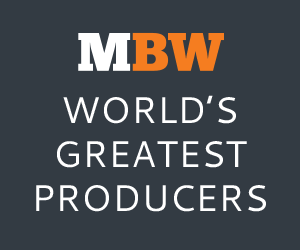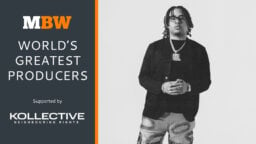MBW’s World’s Greatest Producers series sees us interview – and celebrate – some of the outstanding talents working in studios across the decades. Here we meet Lostboy (aka Pete Rycroft) who has just had a very hot summer – playing a major part in huge hits for Calvin Harris and Ellie Goulding (Miracle) and Kylie (Padam Padam). He talks about how those projects came about, why they worked – and where they fit into his incredible career so far. World’s Greatest Producers is supported by Hipgnosis Song Management.

Pete Rycroft got off the plane in London to find his homeland enjoying a Lostboy summer.
Rycroft – the British songwriter-producer who has long been a big noise in the States – had jetted back from New York for the Ivor Novello Awards in May, just as Calvin Harris and Ellie Goulding’s Miracle (co-written by Rycroft) was getting into its stride for an eight-week stay as the UK’s No.1 single.
Around the same time, Kylie Minogue dropped Padam Padam – produced by Lostboy and written by Rycroft with Ina Wroldsen – a song that would go viral, become a Pride anthem, give Minogue her first UK Top 10 hit in almost a decade and even, somewhat belatedly, make BBC Radio 1 start playing her again.
In short, Rycroft’s work has been the sound of the UK’s heatwaves-and-downpours season.
“You wait ages for a bus and then two come along at once,” he quips, greeting MBW at the door of his Tardis-like studio, hidden away in a quiet bit of north-west London.
“But seeing people at the Ivors and at the pub afterwards, with everyone saying, ‘Congrats, this is amazing’ was great. It suddenly felt very real, and it was so nice to feel some tangible moment here in the UK, at home.”
Both songs showcase Lostboy’s trademark sound – irresistible pop music with a darker edge – a sonic template that he puts down to his eclectic musical apprenticeship.
He grew up listening to his Dad’s collection of glossily produced 1980s albums (“Trevor Horn has always been a massive influence, if not consciously, then definitely subconsciously”). He played in a touring blues band and also drummed for a prog-metal outfit called Purgatory Shift (“The logo was intense”).
Indeed, he first picked up some production skills as he “desperately tried to make these awful songs sound better”.
“It was quite technical, progressive metal,” he says. “Really complicated, lots of weird time signatures and key changes – and it was the science of it that I became obsessed with. Eventually, I realised that science applies to pop music as well, but in an even more granular way.”
Rycroft quit playing in bands and went to music college, before dropping out as he started picking up sessions when one of his tunes got played on BBC Introducing. He met his lawyer (Jo Brittain of Russells) and his manager (Matthew Rumbold of Transmission).
But his key break came when Saul Fitton heard something he’d done and played it to Fraser T Smith.
Smith loved it, gave him plenty of additional production work and signed him to his own 70Hz publishing company (Rycroft has since followed Fitton to Warner Chappell and now Sony Music Publishing).
Rycroft fizzes with stories from his early years of working with the likes of Gabrielle Aplin and Becky Hill in his bedroom studio (“It really was my bedroom,” he laughs, “There were lots of awkward situations with flatmates bursting in when we were recording!”).
But nowadays he’s usually found in bigger rooms. His huge Stateside success has been boosted by his aptitude for ‘pitch songs’ – i.e. tunes that are written in the studio and then shopped to artists (both Miracle and Padam Padam came about that way). His list of US smashes includes everything from Ava Max’s Million Dollar Baby to Tiësto and Ava Max’s The Motto, and from Zedd/Kehlani’s Good Thing to Jackson Wang’s 100 Ways. He’s also worked with Lewis Capaldi, Anne-Marie, Rita Ora, Sabrina Carpenter and K-pop stars IVE and been a key contributor to the rise of both Griff (Black Hole) and Tom Grennan (Little Bit Of Love).
“I’m always just trying to write the songs I love with the artists I love. That hasn’t really changed.”
Now his UK renown is finally catching up with his US status, with his phone “metaphorically” ringing off the hook with offers. But it’s clearly not his style to get carried away.
“It’s lovely to be wanted more off the back of [the success], but it’s weird,” he shrugs, making tea and settling down on his studio’s “cheap but comfy” sofa to talk to MBUK. “I’m always just trying to write the songs I love with the artists I love. That hasn’t really changed.”
He’ll be heading back to the States to do just that shortly, teasing “lots of exciting stuff that I can’t talk about”. But for now, it’s time to find out how this Lostboy found his groove…
Did you know you were going to have two massive hits this summer?
No. Both of them were sort of a punt. The demo of Miracle was much slower and darker. The first time I heard Calvin’s superfast trance version, my first thought was, ‘This is either going to do incredibly well or flop’. It was either going to make or break and obviously, luckily, it was the former!
Same with Kylie. She’s had an amazing career but she’s not a name that lots of people on TikTok necessarily knew and that’s what drives records these days.
Sometimes you get a sense within the industry before a song comes out of whether it might do something, if everyone’s buzzing about it – and there was nothing on that one! But, when it came out, it was just rabid on social media.
I’ve never really experienced that with any song, not even the Calvin song or the US songs that have done really well commercially. I’ve never seen anything like in terms of memes, people talking about it online and it spreading organically.
What did you learn from Fraser T Smith?
The main reason that I admired him so much was because I’ve always wanted to work on all sorts of genres within the pop music umbrella.
When I started working with him, he’d done Britney and Adele and he was just about to embark on this whole new grime phase of his career with Stormzy and Dave. So, to see that happening in front of me made me think, ‘It is possible to be across everything and to be lost within genres’. That’s partly where the name Lostboy comes from: I’ve never just been doing one thing, it’s always been about spreading my bets – not in a tactical way, just because I love working on loads of different things. He was that guy and it was so nice to see it was possible.
But the main thing I learned from Fraser was how incredible he is with artists. He’ll spend an hour or two, just making sure the vibe is right, getting to know them and exactly what they’re going through. It was so useful to see that in the flesh. Like, ‘Oh, this is how you do it!’
Do you prefer writing or producing?
I see them as totally linked, especially in pop music. I’ve done sessions as just a songwriter before but, more often than not, I’m producing as well. I find it really hard to be boxed in as ‘a track guy’ or someone who’s just working on the beat, because all of that is irrelevant to me without the song or whatever the direction is.
“When I’m in a session with UK writers, sometimes it feels a bit like four people sat on a sofa, staring at the back of my head waiting for a vibe to kick off.”
That’s part of the reason why I’ve found the US to be more of a home for my songs; the way people work over there is more song-driven than here. When I’m in a session with UK writers, sometimes it feels a bit like four people sat on a sofa, staring at the back of my head waiting for a vibe to kick off. That’s not really enough for me – and I don’t think those songs necessarily translate globally. But there are a lot of brilliant UK writers that I love.
Do you mind the proliferation of writing and production credits in modern pop?
Not at all, if they’re adding value. And sometimes it does take a village to get things over the line. But there are times when there can be too many cooks and it becomes part of the A&R process.
Like, if this hit writer has worked on the bridge, it’s covering the A&R’s arse – if the song doesn’t do well, they can be like, ‘Well, I did get so-and-so on the bridge and involve the best hit songwriters I could get’. Sometimes that works, sometimes it just waters down the idea.
Don’t you get some of those calls?
I’ll get sent a lot of stuff where they’re like, ‘Oh, we just a want bit of magic sauce’ or some other weird phrase that doesn’t mean anything!
When I get asked to do those things I’m thinking, ‘You’re not asking me because it’s good for the song, you’re asking me because Miracle was No.1 for eight weeks’. It definitely works sometimes, but you can’t base A&R decisions solely on commercial success. And sometimes the best songs are just me with one other person.
“Kylie, in a real classy move, didn’t ask for any publishing and isn’t credited as a writer. In a lot of instances, the artist would ask for writing anyway, but she was really cool about it.”
Padam is an example of that – that was just me and Ina Wroldsen, who’s amazing – that was the first time we’d worked together. And Kylie, in a real classy move, didn’t ask for any publishing and isn’t credited as a writer. In a lot of instances, the artist would ask for writing anyway, but she was really cool about it.
It’s also admirable that there are true recording artists out there like that who are brave enough to be like, ‘Yeah, I didn’t write it, but I’m performing the hell out of it’.
Breaking artists has become a real problem for the UK industry. You worked with both Griff and Tom Grennan: did you always think they’d make it?
Yeah. It’s one of the only cliches in the music industry that I’m fully behind: when you meet someone and they have ‘that thing’, there’s no going back from that. It’s so undeniable that the only way this can fuck up is if someone else fucks it up – it’s not going to be them.
When I first worked with Griff, I remember coming away from that session thinking, ‘I would cancel everything just to work with her on anything’. It was just obvious that she was going to have a moment at some point.
And Tom is one of the hardest-working pop stars I’ve ever seen. He really gets the hustle side of it and he’s a brilliant, incredible performer.
Has TikTok changed the way people make records?
Yeah. People say it’s completely changed the landscape of songwriting – I’m not sure if that’s true, but it’s definitely the most important thing right now for launching an artist or pushing a song the extra mile.
“I try not to start a song thinking, ‘What’s going to work on TikTok?’, but it sometimes is a thought in the process.”
I try not to start a song thinking, ‘What’s going to work on TikTok?’, but it sometimes is a thought in the process.
The one thing it’s really taught songwriters is that lyric is king. Whether the song is sped up or slowed down, the lyric is the same – and that’s what people connect to.
How will AI change production and songwriting?
I’m pretty open-minded about it. It’s something we’ve been using for years without realizing, especially in production. There are so many plug-ins and different settings or different pieces of software that are essentially AI. You could argue a dynamic EQ is artificial intelligence in a way.
It’s a bit different songwriting-wise. That Drake song that was completely AI – people who didn’t know it was AI were like, ‘This is a great Drake song’. Whether you know it’s AI or not makes a big difference.
Are songwriters and producers given enough respect by the industry?
I don’t feel fully qualified to comment because I’m a producer-songwriter. It’s not easy for producer-songwriters, but it’s definitely easier.
I’m not really sure how I would have managed to survive as a brand-new songwriter, working my way into the game without a publishing deal and without the occasional production commission.
“I’m not really sure how I would have managed to survive as a brand-new songwriter, working my way into the game without a publishing deal and without the occasional production commission.”
There does need to be some sort of shift in the way songwriters are paid. There should be songwriter fees, at least to cover travel and food.
Even if you get that first cut, you’re not going to see that money for six months. There needs to be a turning point where labels offer a small fee, like £500 for a songwriter if the song’s released, upfront.
That would really help new songwriters. They should be getting points on records as well, but that’s a whole other argument…
If you could change one thing about today’s music industry, right here and now, what would it be and why?
The thing that frustrates me the most is when people feel they can’t be themselves. The songwriter who’s posturing in a room to blend in with the artist, because they think that’s going to help them get a song, whereas in reality most people are drawn to people who are unashamedly themselves. I certainly am.
“my favorite A&Rs are the ones willing to fully back themselves and take chances on things, not just do what they think their boss is going to be most chilled about.”
Similarly, my favorite A&Rs are the ones willing to fully back themselves and take chances on things, not just do what they think their boss is going to be most chilled about. There needs to be more personality in A&R, because that’s going to feed into the development of artists which is the one thing we’re really lacking right now.
Labels are signing artists off viral songs and often it’s the song or the lyric that has done the thing, not the artist. The A&R is just following the trend and not really thinking – that’s the most frustrating thing.
So yeah, if everyone could just be themselves [laughs]; that’s the most floaty answer!Music Business Worldwide





